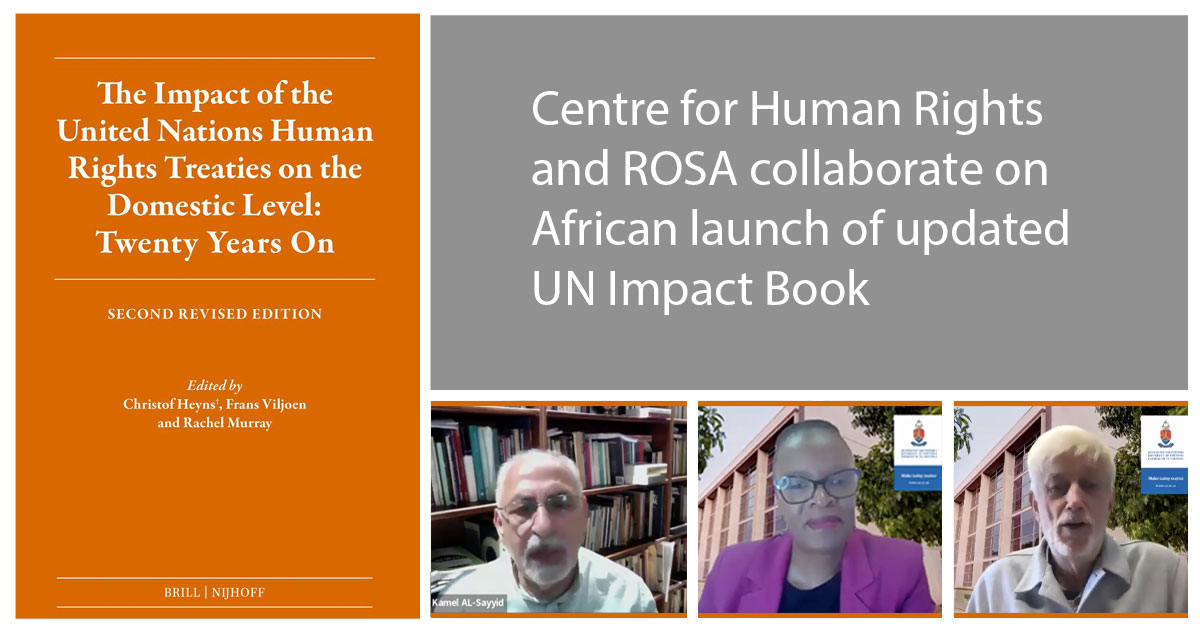Collaborating with the Regional Office for Southern Africa (ROSA) of the Office of the High Commissioner for Human Rights (OHCHR), the Centre for Human Rights, Faculty of Law, University of Pretoria (Centre) on 23 May 2024 hosted a virtual launch of the recently published open-access book The Impact of the United Nations Human Rights Treaties on the Domestic Level: Twenty Years On. This book, edited by Frans Viljoen and Rachel Murray, together with the late Christof Heyns, contains studies on the implementation of the UN human rights treaty system in 20 countries across the world. The book was dedicated to the memory and legacy of Professor Christof Heyns.
Four African countries -- Egypt, Senegal, South Africa and Zambia -- are covered in this publication. During this webinar, the authors of three of these chapters (Professor Mustapha Kamel Al-Sayyid, Foluso Adegalu and Dr O’Brien Kaaba) presented summaries of their findings. All four these countries have ratified most of the nine core UN human rights treaties, with Senegal having accepted to be bound to all these treaties.
The presenters highlighted examples of the meaningful impact of UN human rights treaties. In Egypt, UN treaties had a profound influence on the institutional architecture dealing with human rights, as evidenced by the establishment of the National Human Rights Council, and bodies specifically targeting women, children and persons with disabilities. In South Africa, UN human rights treaties have left their mark on the Constitution, legislation and policies. In numerous cases, the judiciary relied on these treaties and treaty body interpretations to advance human rights for South Africans. In Zambia, the International Covenant on Civil and Political Rights exerted its influence over the national legal system especially at times when the protection of human rights at the domestic level was weakened by the incumbent political regime. In Senegal, especially two of the more recently ratified treaties, the Convention on Migrant Workers and their families, and the Convention on the Rights of Persons with Disabilities, have led to domestic legal changes.
Despite some tangible evidence of positive impact, challenges and opportunities remain. Some of the cross-cutting challenges are: governmental attitudes based on outdated notions of sovereignty; a lack of coordination between government departments; a lack of dedicated resources; and resistance based on culture and religion, combined with the politicisation of religion.
Abigail Noko, the Regional Representative of the Regional Office of OHCHR in Southern Africa, moderated the session. She emphasised that UN human rights treaties do matter, but much work still needs to be done. The key to enhancing the impact of UN treaties at the domestic level is greater domestic mobilisation, and getting domestic constituencies invested and energised to ensure the most meaningful impact of UN human rights treaties at the domestic level.
Frans Viljoen drew attention to the fact that book is already outdated, as the subject matter is in constant evolution. He further noted that the publication is part of ongoing work-in-progress aimed at bringing together primary data and analyses about the impact of UN human rights treaties in all countries across the globe.
Webinar Recording
For more information, please contact:

Professor of International Human Rights Law
Tel: +27 (0) 12 420 3228
frans.viljoen@up.ac.za


